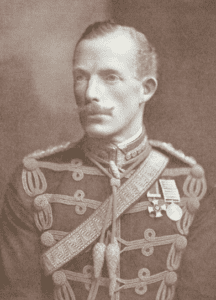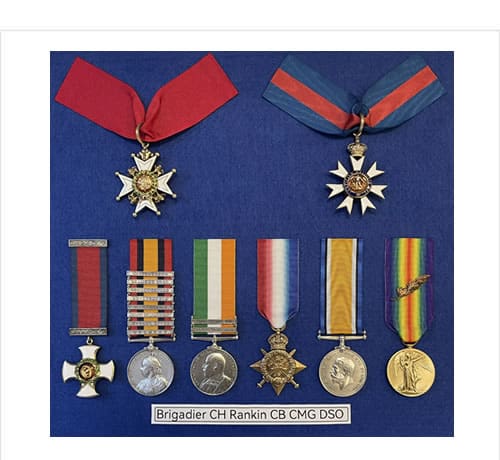Charles Herbert Rankin, was born 26 May 1873, second son of Sir James Rankin, 1st Baronet, and Annie Laura, second daughter of Christopher Bushell, JP, of Hinderton, Cheshire.

He was gazetted to the 7th Hussars 21 October 1893, and was promoted to Lieutenant 1 July 1896.
He served in South Africa in 1890, and again saw active service in the South African War, as Special Service Officer in South Africa 23 September 1899 to 31 December 1901 (including service as Adjutant, Rimington’s Guides, to March 1901, and as District Commandant).
He became Captain 30 December 1899. Captain Rankin was in command of the Western Province Mounted Rifles from 22 June 1901 to May 1902, and took part in the advance on Kimberley, including actions at Belmont, Enslin, Modder River and Magersfontein.
He was present at the Relief of Kimberley; and at the operations in the Orange Free State, February to May 1900, including operations at Paardeberg (17 to 26 February), actions at Poplar Grove, Driefontein, Vet River and Zand River. Operations in the Transvaal in May and June 1900, including actions near Johannesburg, Pretoria and Diamond Hill (11 and 12 June); operations in Orange River Colony, May to 29 November 1900, including actions at Lindley, Bethlehem, Wittebergen and Bothaville; operations in Cape Colony, 1899 to 1900, including actions at Colesburg (1 January to 12 February); operations in Cape Colony, March 1901 to 31 May 1902.
He was mentioned in Despatches [London Gazette, 27 September 1901] received the Queen’s Medal with eight clasps, the King’s Medal with two clasps, and was created a Companion of the Distinguished Service Order [London Gazette, 27 September 1901]: “Charles Herbert Rankin, Captain, 7th Hussars. In recognition of services during the operations in South Africa”. He was invested by the King 18 December 1902.
Captain Rankin was Adjutant, Imperial Yeomanry, 17 October 1902 to 16 October 1905, and was promoted to Major 26 June 1911.
Major Rankin served in the European War from 1914; as Temporary Lieutenant Colonel, whilst commanding the 4th Hussars, 17 April 1915 to 15 April 1916.
He was given the Brevet of Lieutenant Colonel 1 January 1916; commanded the 105th Infantry Brigade, BEF, 16 April 1916 to 30 April 1916; the Ambala Cavalry Brigade, British Armies in France, 1 May 1916 to 5 March 1918, and the 4th Cavalry Brigade, British Armies in France, from 9 April 1918.
He was given the Brevet of Colonel 3 June 1918.
He was twice mentioned in Despatches, and created a CMG in 1916.
He married, in 1908, Enid, daughter of Judge Williams, and they had one son and one daughter.


